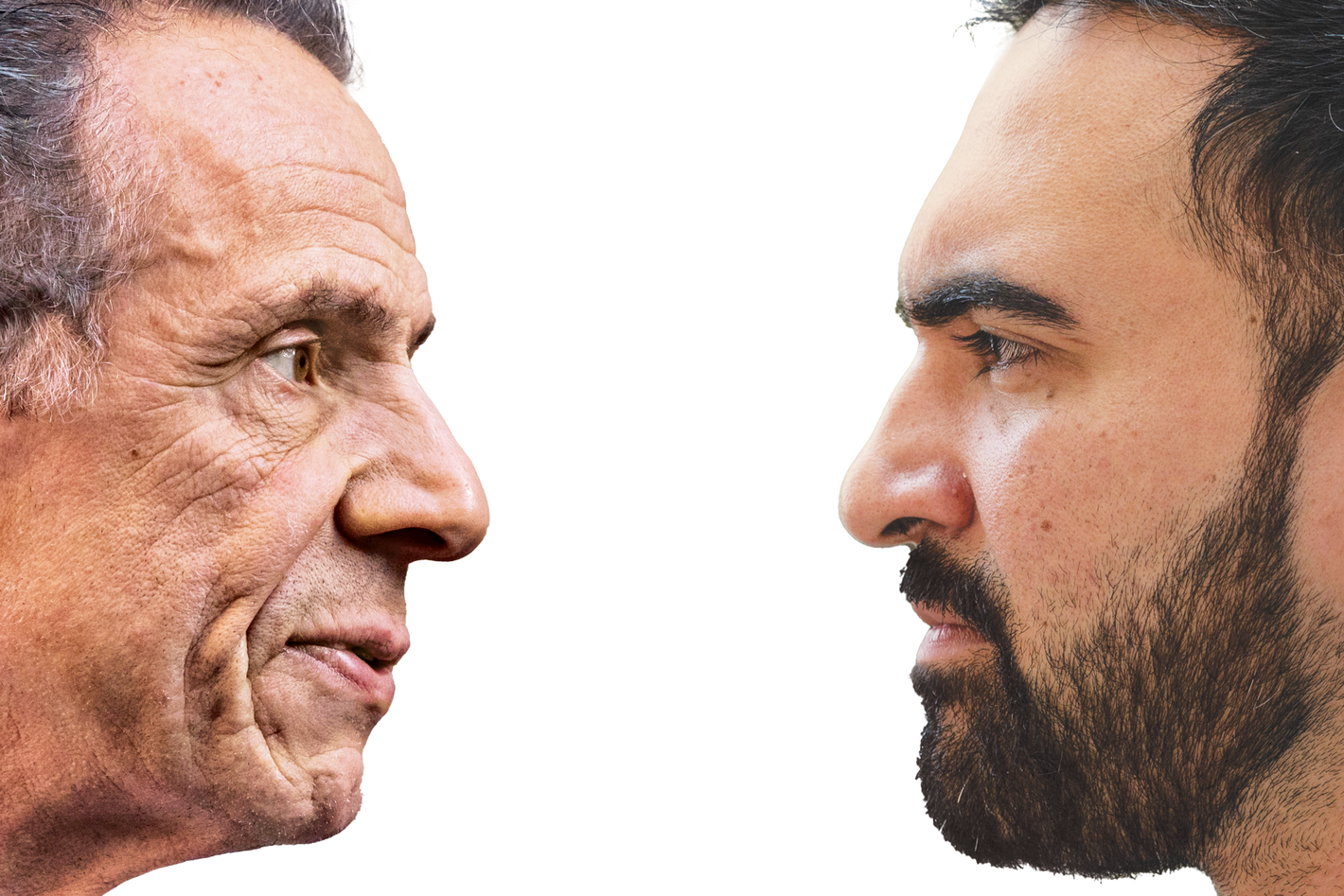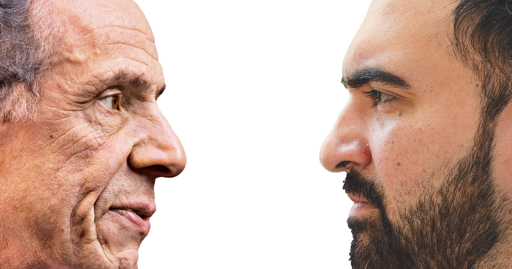 Photo: Spencer Platt/Getty Images (Cuomo), Victor J. Blue/Bloomberg (Mamdani).
Photo: Spencer Platt/Getty Images (Cuomo), Victor J. Blue/Bloomberg (Mamdani).
When Andrew Cuomo decided to ignore the advice of many of his supporters and jump back into the New York City mayoral election after a bruising primary defeat, his campaign knew it needed to do one thing: turn the race into a two-person contest with Zohran Mamdani. And so Cuomo savaged Mamdani over his rent-stabilized apartment, ties to the Democratic Socialists of America, a vacation to Uganda, and his shifting positions on policing, while mostly ignoring the rest of the field.
With some eight weeks till Election Day, it looks as if Cuomo is finally going to get the two-man race he wants. But the terms of the contest have been completely upended. In a city that has seen its share of bizarre political moments over the past couple of decades, from a congressman’s penis pictures to the election of a congressional fabulist, the 2025 mayoral race is somehow still breaking new boundaries in political weirdness. Cuomo, the resistance hero who was once seen as a potential 2020 Democratic presidential candidate, has been talking up his close ties to Donald Trump. Mamdani, the democratic socialist who won the primary despite statements about how the NYPD is a rogue organization that should be abolished and capitalism equals theft, has been meeting with business leaders and racking up endorsements from rank-and-file Democrats. Eric Adams inherited a rush of enthusiasm (and donor money) after the primary but failed to translate any of that into a polling bump. Republican Curtis Sliwa’s proposal to unleash a feral-cat brigade to clean up the city’s rat population was somehow the least-surreal thing happening.
And then, the week after Labor Day, news broke that Trump was trying to edge Adams and Sliwa out of the race, floating administration jobs or plush sinecures for each of them if they dropped out to make a lane for Cuomo. Supporters of both the president and the former governor, including billionaire supermarket magnate John Catsimatidis, had been pressing the case that Mamdani would be a disaster for the city. When asked at a press conference about his involvement in the race, Trump said, “I’d prefer not to have a communist mayor of New York City.”
Mamdani immediately accused Cuomo of behind-the-scenes machinations. “I’ve heard rumors of this for months,” Mamdani told me on September 3 after an “emergency” press conference he held on the news. The president, he said, “knows that Andrew Cuomo represents the very kind of politics that he practices. He knows that he could pick up the phone and have a conversation with him without even having to consider the impact it would have on New Yorkers and that the entire conversation would be about the two of them and their interests.” Cuomo denied he had any involvement in Trump’s meddling, though he recently told a crowd of Hamptons donors he knows Trump well and believes “there’s a big piece of him that actually wants redemption in New York.”
Both Sliwa and Adams denied having any intention of leaving the race. Adams held a press conference in which he took aim at Cuomo, calling him a snake and a liar, asserting that only the sitting mayor could beat Mamdani. But the damage was done. For Adams, it was made worse when the New York Times reported that he had flown to Florida to meet secretly with Steve Witkoff, one of Trump’s advisers, a sign the mayor was at least not totally oblivious to the realities of his struggling campaign.
It was a swift fall after a dizzying rebound. In June, Wall Street and real-estate titans were apoplectic over the notion that the Democratic nominee would install Trotskyite cadres across city government. Cuomo still hadn’t said if he was running in the general election. So in the mad scramble among the donor class to find someone to stop Mamdani, money poured into Adams’s coffers. One wealthy financier reached out with an offer to host a $50,000 fundraiser, and the Adams campaign turned him down. At that time, a mere $50,000 fundraiser simply wasn’t worth it.
By the end of the summer, Adams would have taken whatever change could be shaken out of the seat cushions. He was caught in a new swirl of scandal, baroque even by often-embattled mayors’ standards: One aide slipped a wad of cash concealed in a bag of potato chips to a reporter, and another was indicted (for a second time) for trading a cameo on a Hulu show for scrapping a planned bike lane in Brooklyn, among other allegations. No fewer than five senior police officials sued the administration for creating a culture of corruption and favor-trading at the NYPD. Polls showed Adams in the single digits, just a few points above Jim Walden, an all but unknown wealthy attorney who dropped out of the mayoral race at the start of September. Sliwa was polling higher in the mid-teens.
Still, Cuomo needed all other candidates besides the front-runner fully sidelined because he was polling around 15 points behind Mamdani. In a head-to-head race, however, the same surveys showed the possibility for a dead heat or, in one instance from a July poll, a double-digit Cuomo lead.
Mamdani has had mixed success breaking 40 percent in the polls, and the fear among his supporters is that he has a ceiling somewhere below 50. All summer he worked to consolidate the Democratic Party behind him, assuaging the concerns of sympathetic business leaders and disavowing some of his earlier, more radical statements. He also won the support of Democratic officials and labor unions that had backed Cuomo in the primary.
But campaigning as a regular Democrat was an uncomfortable fit for someone who only a few years ago was trying to make it in the music and entertainment industries. Mamdani has privately lamented that the trappings of being the Democratic nominee, with its chauffeured SUVs and security, take him away from the hand-to-hand contact that propelled his primary win. And the campaign has wrestled internally with the question of whether or not Mamdani should position himself as more of a normie Democrat in a city where Democrats out-number Republicans six to one or lean into the youthful outsider idealism that got him where he is in the first place. After all, it’s not as if Democrats are incredibly popular right now, and the entire universe of Democratic institutional support did Cuomo close to no good in the primary.
Then came the news that Trump wanted to intervene on Cuomo’s behalf. Had Adams or Sliwa simply quietly dropped out and ended up with an administration appointment months down the line, the link between them and Trump wouldn’t have been as clear. But the ham-handed and nearly public machinations by Trump and people supportive of Cuomo have been so shameless that it’s fair to wonder if the whole thing is a psyop, a scheme to secretly boost Mamdani so that Trump can have him as a foil. Regardless, Trump casting himself as Cuomo’s virtual running mate lit a fire for the Mamdani campaign.
At his emergency press conference, Mamdani spoke with the kind of passion that he hasn’t much harnessed since winning the primary in June, calling Trump’s parachuting into the race “an affront to what makes so many of us proud to be Americans: that we choose our own leaders, not that they get to pick themselves.” His campaign sees this as an opportunity to reignite youth interest as well as energize the center-left Democrats Mamdani needs to attract.
“This is no longer a race between Zohran and an opponent trying to cobble together a coalition of voters who don’t like him,” said Morris Katz, a senior Mamdani adviser. “It’s a race between Zohran and Donald Trump.”
More on the NYC Mayoral Race
Adams Accuses ‘Snake and Liar’ Cuomo of Trying to Push Him Out of RacePressure Mounts for Eric Adams to Drop Reelection BidIs Eric Adams About to Drop Out of the Mayoral Race?
From Intelligencer - Daily News, Politics, Business, and Tech via this RSS feed

